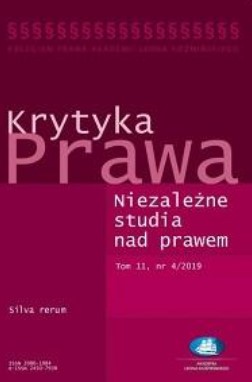Urzędnicy wyborczy. Kilka refleksji o nowej instytucji polskiego prawa wyborczego
Electoral Officials. Some Reflections on the New Institution Included in the Polish Election Law
Author(s): Krzysztof SkotnickiSubject(s): Constitutional Law, Public Administration, Government/Political systems, Electoral systems
Published by: Akademia Leona Koźmińskiego
Keywords: election law; organisation of elections; electoral officials; election;
Summary/Abstract: The 2018 amendment of the Polish Electoral Code established the institution of electoral officials, who replaced the institution of electoral plenipotentiaries, existing since 1998. One of the main differences between the two institutions is that electoral officials may not work at commune offices in charge of preparing and holding election in the area of their jurisdiction. The aim of the adopted solution was to isolate local government administration from the election process. The article offers a critical analysis of the institution of electoral officials. The subject matter of the discussion is both the legal regulation and the conclusions drawn from the examination of the institution in question, conducted by the Stefan Batory Foundation after the end of the 2018 local government elections, when the electoral officials fulfilled their statutory duty for the first time. The discussion leads to the conclusion that the establishment of the institution of electoral officials was not well thought out, and actually took place without appropriate consultation. The provisions of the Electoral Code are often vague. They have not been clarified to a sufficient extent in the resolutions adopted by the National Electoral Commission either. It is reasonable to have electoral officials appointed for a six-year term of office by the Head of the National Electoral Office. What is surprising, however, is that electoral officials may run for an office during elections taking place in a constituency outside of their area of activity as well as engage in election campaigns – except for their own campaigns – while they should remain completely impartial during the election. The vague status of electoral officials and of the principles of their remuneration made it very difficult to attract individuals willing to perform this function. The headcount originally assumed had to be reduced by half; now it is 2,600. It is also necessary to reconsider the number of electoral officials assigned to individual communes. A major flaw of the adopted regulation is the lack of a clear division of duties and responsibilities between electoral officials and communes
Journal: Krytyka Prawa
- Issue Year: 13/2021
- Issue No: 1
- Page Range: 80-97
- Page Count: 18
- Language: Polish

